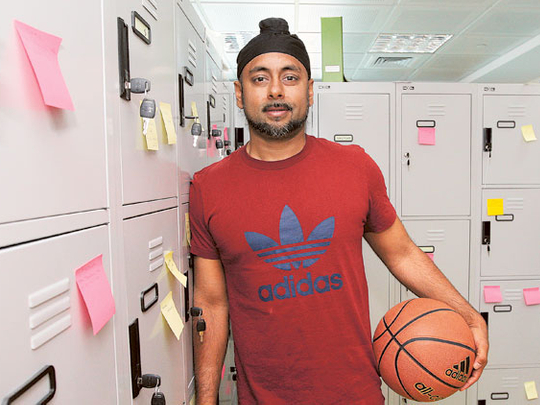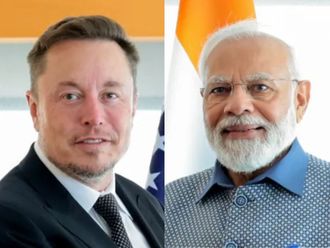
Davindar Rao (Derv) started DUPLAYS in 2007 to connect people wanting to play recreational sports in Dubai. DUPLAYS has grown from 20 friends playing ultimate Frisbee to over 35,000 members playing over 15 sports. DUPLAYS is monetising the sports-based social network web platform to serve the needs of individuals, families, institutions and communities. Duplays has expanded geographically across the across region
How did DUPLAYS happen?
I studied science in Toronto en-route to medical school. Eight years of studying medicine looked forbidding so I did an MBA. I then worked in Johnson and Johnson in sales for six years and really enjoyed work.
And then I pivoted.
I was watching Oprah interviewing an heiress of the J&J family. Oprah asked her, “What is the most difficult thing you think about every day.” She replied, ‘What shoes I am going to wear?’ My mind switched off; I couldn’t imagine working for someone to decide which shoes she wanted to wear. I resigned, got a seven month severance package, and decided to travel till the money ran out. I saw a video of Dubai, came here for two weeks, moved to Nepal and then Tibet. I was at the Beijing airport on the way to Toronto when I decided to return to Dubai. I had no idea what I was going to do. I took the room in Jumeirah and started applying for jobs. I reconnected with Ravi, whom I had met at a party. I wanted to meet people, outside the social scene, to play sports. This is how DUPLAYS started; twenty people started meeting to play. Slowly more people started joining us. In September 2007 I talked to Ravi and said, “May be there is a business here. I don’t need a lot of money to survive. I need my rent of Dh5,000 a month. You keep working. Let me test this.” I took my first salary from DUPLAYS about 2 years ago.
There were three drivers. One, I was a consumer; I played sports four nights a week and was paying somebody else to do what I now do as a business. Two, Ravi and I are avid sportsmen. We play all sports. So when we wanted to organise a game we understood what we were doing. Three, we were doing what we love.
When did you know that sports networking could become a business?
Our start was low-key. We attracted customers by making and displaying posters at different Spinneys. For the venues we made presentations to owners of facilities. We first organised a game of football in October-November 2007 at the Metropolitan Hotel, then added Touch Rugby and Basketball. The idea had unanticipated traction. There was a demand for our services. People were paying to network around sports and we were getting different sports facilities to use. DUPLAY was in startup phase for 18 months.
When did you first price your service?
We charged a participation fee of Dh20 almost straight away. Our initial price was instinctive. We said — “let us see if people are willing to pay for our service. We can then figure out the business.” We quickly realised the “true” cost of running the business. Our pricing was based only cost of equipment and consumables; Ravi and I were not accounting for our time.
Any surprises during implementing?
We thought we understood sports. I didn’t realise the detail and discipline that business needed. Our initial costing was out of whack. We didn’t budget for office costs. We were working at “The Shelter” and in coffee shops. We didn’t realise that business involves many indirect expenses. We now know that the true cost of an employee to a company is 25 per cent higher than the salary because of costs like health insurance.
Who helped you start?
We connected with Jimmy who runs a large family business in Dubai. He made entrepreneurship and business real for us. We stayed in his place for two months. It was 24 X 7 mentorship. I realised the difference of connecting with entrepreneurs, managing their own businesses, and professionals, who work. In Toronto I rarely met entrepreneurs in my social circle. Dubai is different. We meet more entrepreneurs than professionals.
How has DUPLAYS evolved?
We started with a few users. We then offered services that we thought everybody wanted. Two thirds of the customers didn’t want “our” services. We went back to the drawing board to identify and deliver new services for people who didn’t want what we did. Some customers wanted to search and book sports facilities for their kids. For example a swimming lesson in a pool. We discovered hotels and schools with unutilised facilities and built the bridge connecting need with supply. Our business is evolving as a platform website; like Airbnb. Airbnb is a community marketplace for people to list, discover, and book accommodation whereas DUPLAYS will become a platform to connect users with sports facilities. The site is becoming more sophisticated with the ability to book and manage facilities. We have met Dubai Municipality. They realise the economic value of having an organised system to give users the ability to book a tennis court or an open field at a nominal fee.
A corporate market segment has emerged and become a large part of the business. Brands come to us and say, “Organise a sports event for our customer demographic.” Companies ask us to organise off-site events for team building. We have learnt the psychological underpinnings of the games. This business will develop.
Number of employees?
We have sixteen employees. Sixty part time employees work as referees and administrators. Web development is outsourced to Egypt.
Important milestones of DUPLAYS journey?
We realised that business is more than just latent customer needs; we had to do different things to reach and convert customers. The second realisation was the need to hire people to grow the business; delegating tasks would allow us to work on bigger things. Brian joining us was an important milestone. He is technical and analytical in his thinking, and impacted everything in the business. He brought in structure. Ravi and I are MBAs; if we wanted to do something, we just went ahead. Brian is a detail person. He brought metrics into our thinking. He made us realise that some things work and others don’t.
When did DUPLAYS become a company?
About three years ago. We needed capital to hire people to grow. We started looking at our numbers, trying to figure out how to evolve the business, how to make it investible, learning how to pitch, and began meeting investors. Investment was a self-test; if somebody will invest then we must be a business. Fadi Ghandour invested in us two and a half years ago.
Have you organised work amongst the three partners?
We complement each other based on our skill sets. I focus on events because it is a big chunk of our revenue. Ravi works closely with investors. Brian leads the technical web development team. Brian is always thinking ahead. I think of the now. And Ravi thinks of what is best.
How do you manage customer satisfaction in a service business?
We started this recently. We are about to raise a second round of funding. Our investors told us that we needed to become organised in getting feedback and reporting what was happening in the business. We mobilised the entire office to call customers and solicit feedback.
Staffing challenges?
Startups require long working hours. We look for staff that is unencumbered and ready to invest time. We initially recruited staff with full compensation packages, including housing. It didn’t work. Financial security did not result in intensity and productivity. This business is about people. We have to have people who understand sports, are passionate about sport and play sports. We can’t give a manual and say do this.
I fret daily that trained and experienced staff will leave. We invest time in people. They learn a new business. And then they leave. Knowledge goes out of the door and we have to start again.
We have not been good at creating an incentive scheme. We give incentives but they are not directly tied to performance.
Do you now manage DUPLAYS with targets and metrics?
Yes, but it works backwards. We decided to give incentives so we had to establish performance measures.
What keeps you worried about the business?
I worry about pay roll every day, about having cash to pay salaries every month.
We diluted 20 per cent in two funding rounds. We had a business that “worked”. We had to stabilise and grow the business; by launching the website in other markets. Most web business models are about connecting people. We raised money for staffing to build the web platform. We first decided to outsource the development. Outsourcing has challenges of timely execution of evolving ideas and building of in-house knowledge. We now have a three full-time technical team — one developer, one designer and another lead person. And it is still not enough. I didn’t realise that it would cost us so much. Web team is a cost centre. They don’t make money. We didn’t realise how long it takes to get things done.
How much have you changed as a person?
I am happier. No one would get me to open up my laptop at 11pm. I do it now. I need to learn how to manage and prioritise my time. I need to work on bigger things because we have good people in the company. At a work level, I need to understand franchising. Growth of DUPLAYS will come from franchising of a service business.
Are you still a startup?
We are a startup because we are not yet fully organised. Our challenge is to self-assess whether we are spending time on the right opportunities. There are aspects of the business that we didn’t know when we started, and now are potential avenues of growth. For example we get emails from talented county players from Africa who need an avenue to showcase their skills. We can build a website platform to make them visible to clubs. Our business can grow in many ways.
How has DUPLAYS grown?
First event had 20 players. Revenue was Dh400. We now have 35,000 members. Our annual revenue is 20,000 times the first event. We are reinvesting all profits.
How much did you invest in DUPLAYS?
Ravi and I invested $30,000 (Dh110,100) each, plus lost salaries for two years. We started with an informational website. We didn’t need upfront capital. We were neither building anything nor trading in products. We launched activities when we saw demand. The risk of loss, of a bad decision, was negligible.
Any guidance for a new entrepreneur?
Selling is the most valuable skill because everything you do in business is you sell. What makes Derv an entrepreneur?
I don’t know. I don’t think analysis because I have a different outlook on things. My impatience may have something to do with it. Everybody has ideas. We often discuss ideas with friends. Discussions invariably focus on risks and why the idea won’t work. I take a view, let us implement, and see what happens. In 2004 I was in Aceh, the epicentre of the Tsunami. I survived even though I was ten kilometres off the coast. I decided that day if I want to do something I will go ahead and do it.
Any tense moments?
I am frugal person. My only monetary motivation was to live in a “nice” place. I didn’t make any money for nearly two and a half years. A year back I went to visit my parents. Dad asked me, “What are you doing?” I replied, “I am organising sports.” My dad just turned around and walked away. I began to wonder if I was doing the right thing. My dad came back with my mum, and said, “We got you educated. You did your MBA. And you are organising sports?’ I said, “Yes.” They then asked me if I was “surviving”. I said, “Yes, I am making enough to live. I am not making money.” They asked me, “How are you managing in Dubai? It is so expensive. Are you eating into your savings?” They breathed a sigh of relief when I told them that my savings were intact. And then they came to Dubai. They were much more relaxed when they saw my work and my life. They saw me doing what I love doing.












